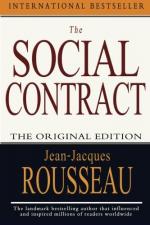
|
| Name: _________________________ | Period: ___________________ |
This test consists of 5 multiple choice questions, 5 short answer questions, and 10 short essay questions.
Multiple Choice Questions
1. When the author writes of a sovereign within the social contract, he refers to which of the following?
(a) The collective authority.
(b) The single ruler.
(c) The outward will of the group.
(d) The person in leadership of the group.
2. The author believes that a human's most basic instinct is the will to do which of the following?
(a) Procreate.
(b) Have power.
(c) Survive.
(d) Rule.
3. According to the author, every human being lives in which of the following?
(a) Chains.
(b) Need.
(c) Houses.
(d) Skin.
4. According to the author, which of the following does man give up in the social contract?
(a) Unlimited speech.
(b) Unlimited property.
(c) Unlimited freedom.
(d) Unlimited power.
5. The author believes that cultural reform must happen when the culture is in which of the following states?
(a) Relatively unsteady.
(b) Relatively solid.
(c) Relatively young.
(d) Relatively old.
Short Answer Questions
1. The author believes that the strength of the individual is insufficient to overcome which of the following?
2. The author states that the second aspect of government is that it exists for the good of which of the following?
3. The author states that slavery is established and perpetuated by which of the following?
4. According to the author, which of the following contributes toward obedience having less value?
5. According to the author, the more Magistrates that there are, the closer that the government is to which of the following?
Short Essay Questions
1. What is one premise cited in the author's argument that imposition of an unnatural authority is contrary to human nature?
2. Why do legislators have to be aware of timing when they present laws?
3. According to the author, why did Peter the Great's reforms fail?
4. How does the author describe humanity's basic animalistic drive?
5. According to the author, what type of geography makes a state unstable?
6. According to the author, what is the only element that can direct the state?
7. What does the author believe to be the foundation of all types of laws?
8. On what type of standard are the authoritarian socio-political system and the family system both based?
9. What does the author state will happen unless natural circumstances are taken into account by the legislator?
10. What happens if a state becomes too large?
|
This section contains 635 words (approx. 3 pages at 300 words per page) |

|




